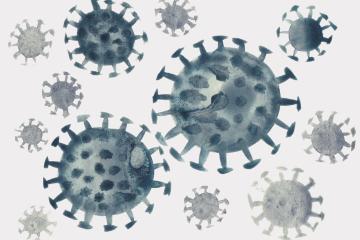Four leading voices in American medicine will visit Johns Hopkins University's East Baltimore campus on Wednesday, Sept. 17, to debate the legacy of COVID-19—where the pandemic response broke down and how that knowledge can inform the responsibilities of both public health systems and the societies they serve.
The event at 6:30 p.m. in the auditorium at the School of Nursing is the second installment of The Hopkins Forum, a series of eight debates hosted in partnership with Open to Debate, the leading nonpartisan media platform steering the national conversation around the art of debate and the importance of free speech, and the SNF Agora Institute at Johns Hopkins University. The two-year series launched in January with a debate about the future of the Supreme Court at the Hopkins Bloomberg Center in Washington, D.C.
"COVID-19 exposed deep vulnerabilities, but it also sparked innovation and redefined resilience," said Lia Matthow, chief content officer at Open to Debate. "This debate aims not only to reflect on the past but also to help shape more effective, compassionate, and forward-thinking policy decisions for the future. The goal is to offer a safe, contempt-free, and fact-based forum. We hope audiences will learn something new, think critically, and be inspired to seek out similar exchanges with people in their own lives."
Wednesday's forum on the societal impact of COVID-19 brings together four national figures who experienced the pandemic from distinct vantage points:
- Jerome Adams, the 20th surgeon general of the United States, served as the operational head of the U.S. Public Health Service Commissioned Corps, where he oversaw more than 6,000 uniformed health officers during multiple health emergencies, including the COVID-19 pandemic.
- Tom Frieden, former CDC director and now president and chief executive officer of Resolve to Save Lives, led New York City's tuberculosis control program and later supported India's Revised National Tuberculosis Control Program through the World Health Organization.
- Dara Kass, a practicing emergency physician in New York City, became a trusted public voice as she appeared regularly on national cable news and other media to help audiences separate fact from rumor.
- Mike Varshavski, a board-certified family medicine physician and UNICEF ambassador, built one of the most influential medical platforms in the world and has used it to counter misinformation and share reliable, evidence-based guidance.
Emmy Award-winning journalist John Donvan will serve as moderator. Adam Seth Levine, professor of health policy and management at SNF Agora, will give opening remarks. Levine studies how people with different expertise and experiences work together to improve the communities they share.
"One of the hallmark features of any new public health crisis like COVID-19 is that things are highly uncertain," Levine said. "Scientists are uncertain about the nature of the threat. The public is uncertain about how worried to be. Community leaders are uncertain about what to say. Policymakers are uncertain about which responses will be effective, ethical, legal, politically acceptable, and economically feasible."
For Levine, this makes collaboration the essential lesson.
"Public health inherently entails collective action, and very diverse people need to find a way to work together," he said. He points to partnerships that proved vital during COVID-19, from health departments working with schools and social workers to sanitation workers and state officials. He points out that forming such relationships during a crisis is especially challenging. Differences in trust, capacity, and authority can slow collaboration, and people are often unsure how to relate across sectors.
"Cross-sector collaboration is vital to public health, but it depends on people already knowing how to relate to each other, speaking the same language, and trusting each other," Levine said. "We need to build these relationships well in advance.
"Regardless of who you think bears responsibility for the last pandemic, we have to be prepared for the next one," he added. "This debate should inspire thoughts of new possibilities. Ask yourself: What kinds of collaborative relationships do we need to protect public health in the communities I am part of? Do we have them? If not, why not, and what can we do about it?"
To attend the Sept. 17 debate in person, register in advance. Registration to view a livestream broadcast is also available.
Posted in Voices+Opinion, Politics+Society
Tagged snf agora institute, covid-19









